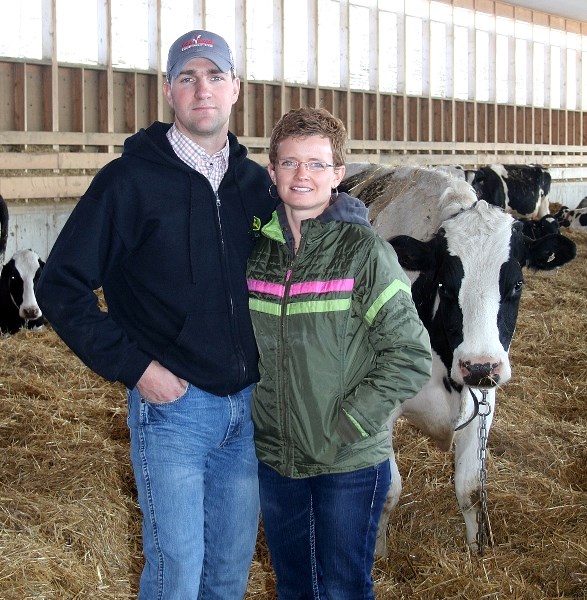While Canada has tried a fly-under-the-radar, make-nice approach with new American president Donald Trump, Trump dropped his gloves last week, attacking the trade relationship and promising not to let Canada take advantage of the U.S.
Trump charged that Canada is hurting American dairy farm workers, following it up by introducing new tariffs on softwood lumber from Canada last week.
“We can’t let Canada or anybody else take advantage and do what they did to our workers and to our farmers . . . Included in there is lumber, timber and energy. We’re going to have to get to the negotiating table with Canada very, very quickly.”
Response from Canadian politicians and members of farming and industry has been a pledge to protect Canadian interests and jobs.
Trump has charged that changed rules and regulations are putting dairy farmers in Wisconsin and New York State out of business.
However, Richard Brousseau, a dairy farmer in the County of St. Paul, says he questions whether the president is speaking from knowledge or ignorance.
“The comments he’s saying seem to lack the evidence of truth, based on the knowledge we have, based on the marketing board and the Dairy Farmers of Canada,” he said, adding that as the Canadian ambassador to the U.S. has also pointed out, “You can’t blame Canada – we can’t end up as a scapegoat.”
While there are only two dairy farms in the County of St. Paul, Brousseau estimated there are about 30 in the Lakeland federal riding. However, all the dairy farms across Canada meet the same standards.
“Every farm is doing the same thing, from coast to coast. We can stand behind our product. It’s really nice to be able to do that, so we’re all on the same page.”
“We definitely can guarantee there are no growth hormones, no hormones of any kind, or antibiotics in any of the milk produced in Canada,” he said, adding there is a rigorous testing to ensure this standard, with American milk simply not meeting the same quality guidelines.
While Canada has changed its domestic policy in the past year, this has not had any impact on American farmers, he said. He feels the change has been used as a reason by America to claim unfair trade practices, when the issue is more that the U.S. processors have built up supply without more international demand.
“They’re at an advantage of five to one to Canada for the export side,” he said, adding he really doesn’t see why the Americans would want to renegotiate free trade with Canada as it concerns dairy when it benefits them.
Brousseau said Trump’s comments have stirred fresh concerns for dairy producers about protecting its supply management system, saying, “For me, personally, it is concerning, because we have a lot of dollars tied into a quota system – if they get rid of the quota system, how am I going to be compensated for the dollars I owe, which is significant?”
However, Prime Minister Justin Trudeau’s comments saying he stands behind the supply management system have been reassuring, he said.
When asked about the president’s recent comments about dairy, Lakeland MP Shannon Stubbs said that the US has simultaneously been Canada’s biggest customer and its biggest competitor for many goods.
The new American president has definitely shown he has protectionist tendencies, and “our Prime Minister needs to do the same for Canada and Canadians,” she said.
“I think it would be good if the Prime Minister and government stood up for farmers, producers and the supply management system.”
Trump followed his salvo on US-Canadian trading relations with an April 24 announcement of upwards of 20 per cent tariffs on Canadian softwood lumber. Softwood lumber trade has long been a bone of contention for the two countries, with U.S. Commerce Secretary Wilbur Ross saying that unfair Canadian subsidies to the lumber industry are hurting the American industry.
That announcement was met with a howl of disbelief from the Canadian industry and politicians, with Natural Resources Minister Jim Carr and Foreign Affairs Minister Chrystia Freeland releasing a joint statement to say the “government of Canada disagrees strongly with the U.S. Department of Commerce's decision to impose an unfair and punitive duty.”
The re-introduction of duties on Canadian softwood exports will endanger thousands of jobs in nearly every region of the country, according to Unifor, which predicts a loss of as many or more as 25,000 jobs.
"Workers on both sides of the border will be the losers of a trade war," said Jerry Dias, Unifor National President. "Tariffs on our lumber have already been squashed. The Americans should have learned their lesson the first time."
In 2002, the U.S. government imposed similar tariffs, but international trade tribunals have consistently over-ruled American duties on Canadian lumber. Appeals, however, can take years, notes the release.
Stubbs took the Liberal government to task for failing to negotiate a new Softwood Lumber Agreement after the last agreement expired on Oct. 12, 2016, saying, “Liberal inaction on the Softwood Lumber file will cost Canadian companies millions of dollars and could result in more closers like the shutdown of the Miller Western Saw Mill in the Village of Boyle.”
She noted that in the last softwood lumber dispute between the two countries, over 15,000 jobs were lost in B.C., with thousands more lost in Alberta. The industry ended up paying more than $5.4 billion in tariffs.
“The Official Opposition is calling on President Trump to do what is right for both Americans and Canadians and reverse this decision. The end result will be an increase on housing construction of $1,000 per house for Americans and the loss of thousands of jobs for Canadians,” said MP Stubbs.



